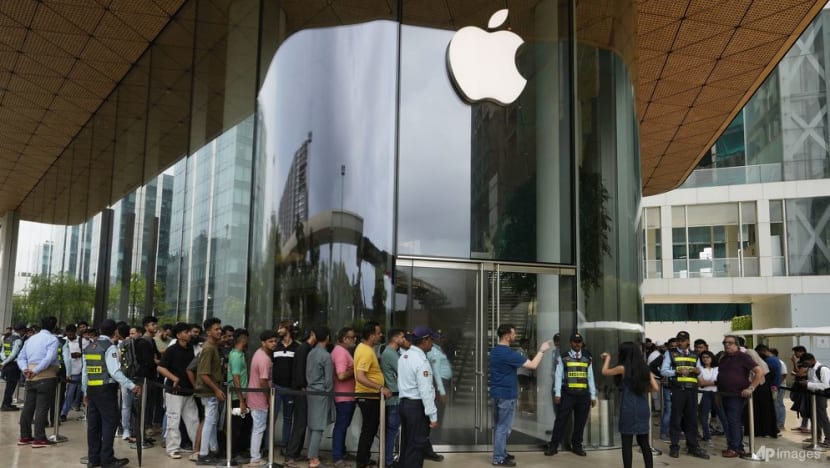India eyes becoming key Apple manufacturing hub, aims to produce 30 million iPhones in 2025
Analysts said the tech giant’s pivot away from China has become more urgent as United States President Donald Trump’s tariffs weigh further on costs.

Customers queue outside an Apple Inc. store during the first day of sale of the iPhone 16 smartphone in Mumbai, India, Sep 20, 2024. (Photo: AP/Rajanish Kakade)
NEW DELHI: A small electronics store in India’s financial capital of Mumbai bears the signs of Apple’s slow but growing presence in the country.
Products by the American tech giant, including the popular iPhone, now make up about a fifth of Maxtech’s total sales – a significant increase from nearly zero a few years ago.
These numbers could go up even more. Apple’s key supplier Foxconn plans to double iPhone production in India this year to up to 30 million units, according to media reports last week.
India is emerging as a major manufacturing hub for Apple, as part of the company’s strategy to diversify manufacturing beyond China, which still accounts for the majority of iPhone production.
Analysts said this pivot towards India has become more urgent after United States President Donald Trump announced sweeping levies on most US trade partners last week, bringing the total rate of tariffs on China to 54 per cent.
EXPANDING FOOTPRINT IN INDIA
Apple opened its first stores in India in 2023 and plans to expand its retail footprint with four more stores this year in Bengaluru, Pune, Delhi and Mumbai.
Its presence in India came several years ago. Its former supplier – Taiwan-based Wistron – first started assembling phones here in 2017, followed shortly by Taiwanese manufacturer Foxconn.
By the end of the 2023 financial year, Apple had 14 suppliers across India, with half of them in the southernmost state of Tamil Nadu.
Among the more recent additions is Apple's US-based screen vendor Corning International, which broke ground last year on a new manufacturing facility in Tamil Nadu in partnership with Optiemus Infracom Limited, an Indian electronics manufacturing and telecom products marketing firm.
Still, Apple’s consumer base in India is modest.
iPhones continue to make up only a quarter of India’s smartphone market, largely due to its price point which includes import costs.

Retailers said they hope prices will drop if more manufacturers open up shop in India.
Deven Shukla, owner of the Maxtech store, said its sales margin on Apple products is about 1 to 2 per cent.
“As they manufacture more in India, the margin could go up to 5 to 7 per cent, which would make it just as profitable as the other brands that I sell. So that would be great for business,” he added.
Supply chain data shows that Apple has been scaling back manufacturing in China since the supply chain disruptions during the COVID-19 pandemic. At the same time, it has been expanding its footprint in India.
Analysts estimate that about 15 per cent of iPhones are currently made in India, with that proportion projected to jump to 25 per cent by 2027.
This means one in four iPhones around the world could be made in India within the next two years.
BENEFITS AND INCENTIVES
As US tariffs on China weigh further on costs, analysts said India can capitalise by being more attractive to Apple’s suppliers.
“Income tax and corporate tax have been brought down very substantially, so all of that makes a very compelling story,” noted Pankaj Mohindroo, president of the India Cellular & Electronics Association.
He said that competitive labour, including the availability of workers for large-scale plants, is also an important factor to bring suppliers to India.
A report by The Economic Times estimated that Apple's pivot could generate 600,000 new jobs in India by the end of this year.
The country’s federal government has been offering benefits and incentives, while states like Tamil Nadu, Karnataka and Gujarat are also competing for Apple’s business by giving capital subsidies as well as exemptions from paying duties on electricity.
Mohindroo said: “In addition to that, when you buy land, stamp duty exemption is given – so there are a clutch of benefits. There are some states which give incentives on employment.”
However, to make the most of Apple’s pivot, analysts said India still needs to invest billions of dollars to create an ecosystem of companies that can make and supply parts locally.
India’s bid to attract Apple could also further complicate ties between Delhi and Beijing, said experts.
“If (India) is to rival China in any way, ironically, it needs Chinese equipment, technology and imports, and Chinese technicians to help it do that,” noted Sanjay Kathuria, visiting senior fellow at New Delhi-based public policy think tank Centre for Social and Economic Progress.
“So, instead of having the current policy where we are vetting every Chinese proposal suspiciously and doing a case-by-case clearance – it would be good that we really give the signal that India is open for Chinese business.”


















